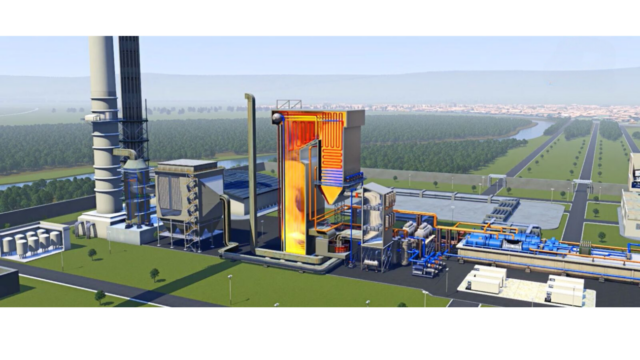Addressing India’s climate challenges demands urgent action and collaboration across sectors. From enhancing resilience in agriculture to curbing emissions from industry and transportation, holistic strategies are vital. By prioritizing sustainability and embracing innovation, India can forge a path towards a more resilient and environmentally sound future.
Here’s a look at how the business community has been contributing to the environment.
Govt. Initiatives
Many local government bodies are doing their part. In March, Ahmedabad Municipal Corporation (AMC) invited proposals for the design, build, erection, commissioning, operation and maintenance of a state-of-the-art 300 Tons Per Day (TPD) capacity municipal solid waste to steam plant under the PPP model.

Ahmedabad, being the 7th Largest Metropolis in India with a population exceeding 63 lakhs, generates approximately 4000 metric tons of solid waste daily. The shift towards sustainable waste management is imperative as the decomposition of organic waste in landfills emits harmful greenhouse gases, contributing to climate change, and toxic substances from various waste types pose health risks to communities.
The project has been awarded to Steamhouse India Limited, based in Surat, Gujarat. The innovative plant, to be established on a 5-acre land at the Pirana Waste dumping site, will significantly reduce environmental pollution by curbing reliance on fossil fuels, thus aligning with global trends towards waste-to-steam projects.
Read more: The search for that supreme EV battery & perfect charging network is on
Employing Waste to Steam (WTS) technology, the project aims to adhere to stringent emission norms while promoting a circular economy through the utilization of Refuse Derived Fuel (RDF). The German-proven technology, employed for the first time in India, promises several advantages, including reduced environmental impact, minimal operational costs, and efficient resource utilization.
Furthermore, this project is anticipated to offer a more cost-effective solution for steam generation, reducing capital expenditure by 70% compared to conventional Waste to Energy (WTE) plants. With significant financial sustainability and reduced annual forex outflow, this initiative sets a precedent for municipalities and industries, inspiring a broader movement towards sustainable waste management practices.
Initiatives by Environmental Startups
While cleantech and environmental startups are already working on improving the environment, their efforts are visible. In May, CLEAR, a bottled water brand in India, tied up with Recycle.Green in its endeavour to become a zero waste brand and realize its target of becoming plastic-negative by 2027.
Bengaluru’s Water Problem
In April, Bengaluru-based Boson Whitewater partnered with NGO SGBS Unnati Foundation to install water ATMs across villages in Karnataka, a project funded by ExxonMobil and Broadridge under their CSR initiative.
Boson Whitewater has seen an increasing interest for its 11 step water recycling technology that converts STP-treated wastewater into high-quality water, known as Whitewater. Pramuk Aqua Heights Apartments in Electronic City is one of the residential communities which has opted for this solution. With over 300 flats and 1500 residents, the community was facing the problem of excess STP treated water. Today, they convert 40,000 litres of STP treated water into clean water every day.
The only way forward for our cities to achieve water sustainability is by recovering potable quality water from wastewater
Vikas Brahmavar, CEO and Co-Founder, Boson Whitewater
Vikas Brahmavar, CEO and Co-Founder, Boson Whitewater, said, “Cities are growing rapidly and the demand for water will continue to increase. With summer already here, the city is experiencing acute water shortage. The only way forward for our cities to achieve water sustainability is by recovering potable quality water from wastewater. Every apartment will have excess STP treated water which is typically drained in large quantities into the garden without realising the actual quantity needed for the garden. Over the last few weeks, we’ve witnessed a surge in inquiries from apartment communities eager to adopt our solution. It’s heartening to see many of these residential complexes prioritize water conservation and explore innovative avenues to optimise wastewater utilisation.”
Even thinktanks like ACCA (Association of Chartered Certified Accountants) met to explore how finance professionals can support the creation of sustainable organisations.
Finance functions are at the heart of organisations and professional accountants are in a unique position to make real, impactful change at the centre for more socially just and environmentally sustainable economies
Sundeep Jakhar, Public Affairs Lead at ACCA India
Sundeep Jakhar, Public Affairs Lead at ACCA India said: “We believe the accountancy profession has a vital role to play in driving positive change for the natural environment and society. Finance functions are at the heart of organisations and professional accountants are in a unique position to make real, impactful change at the centre for more socially just and environmentally sustainable economies. ACCA supports India’s commitment towards sustainable development, in line with its culture of living in harmony with nature.”
MSME Efforts
MSMEs are pitching in to reduce carbon footprint by transforming the way they operate or by integrating renewable energy solutions, or following strict SDG goals. Synchrony, a financial services provider, tied up with Lithium Urban Technologies to launched 25 EVs in their corporate transportation fleet.
It’s all about creating a workplace that thrives and that includes taking care of the planet we all share
Gaurav Sehgal, Senior Vice President Human Resources – Asia, at Synchrony
Said Gaurav Sehgal, Senior Vice President Human Resources – Asia, at Synchrony, “Adding these new EVs to our fleet is a big step towards a greener and cleaner future ahead. It’s all about creating a workplace that thrives and that includes taking care of the planet we all share.”
In February, Hi-COM Network Private Limited, an internet service provider, tied up with Indus Towers Limited, the telecom tower giant formed by the merger of Bharti Infratel Limited and Indus Towers. One of the key aspects of this collaboration is the installation of solar panels on towers, a joint initiative aimed at reducing carbon footprint and promoting eco-friendly practices.
This week, Hitachi Vantara, a data storage, infrastructure, and hybrid cloud management company released its inaugural sustainability report, reinforcing key sustainability credentials and commitments.
We need to be sure that our storage systems won’t start causing bottlenecks that could impact performance and reliability for our end-users. And just as importantly, the energy efficiency of our new VSP arrays is not just better for the environment, it also reduces our operational expenditure
Mehmet Fatih Bekin, data center and cloud services director at Türk Telekom
Mehmet Fatih Bekin, data center and cloud services director at Türk Telekom, said, “We need to be sure that our storage systems won’t start causing bottlenecks that could impact performance and reliability for our end-users. And just as importantly, the energy efficiency of our new VSP arrays is not just better for the environment, it also reduces our operational expenditure.”
Big Companies Pitch in through Tie Ups
Bigger business organizations are tying up with effective players like EV startups to bring about change or by deploying sustainable packaging. In February, BluSmart, an Indian eMobility ride hailing service and EV charging infrastructure network, announced a Power Purchase Agreement (PPA) with Tata Power Trading Company Ltd. (TPTCL) a wholly-owned subsidiary of Tata Power, to source green power.
Enabled by the recently enacted Green Energy Open Access Rules, this partnership allows BluSmart to eliminate Scope 2 emissions from its existing 1.4 million sq. ft. of EV charging infrastructure and future charging hubs.
We are committed to support multiple industries in achieving their RE Goals through our sustainable, innovative and affordable energy solutions
Tarun Katiyar, CEO, Tata Power Trading Company Ltd
“Tata Power Trading Company has been at the forefront of promoting clean and alternative energy adoption through customised offerings. Our partnership with BluSmart will help them in decarbonising mobility in the country. We are committed to support multiple industries in achieving their RE Goals through our sustainable, innovative and affordable energy solutions.” said, Tarun Katiyar, CEO, Tata Power Trading Company Ltd.
In February, Zomato, India’s food ordering and delivery platform announced a ‘Plastic-Free Orders Packathon’ in collaboration with Startup India to encourage innovation in sustainable packaging for food delivery orders. The Packathon is a competition for startups to showcase food delivery sustainable packaging options for restaurants catering to online food orders.
Standalone, mid-tier and budget restaurants, especially those outside metro cities, are struggling with the availability of affordable and functional alternatives to plastic packaging for their deliveries. The problem is particularly acute for restaurants specializing in gravy-based cuisines with multiple condiments and accompaniments. We believe focused innovations hold the answer to this problem and the Packathon is a way to surface and recognize Indian innovators
Anjalli Ravi Kumar, Chief Sustainability Officer, Zomato
Anjalli Ravi Kumar, Chief Sustainability Officer, Zomato said “Standalone, mid-tier and budget restaurants, especially those outside metro cities, are struggling with the availability of affordable and functional alternatives to plastic packaging for their deliveries. The problem is particularly acute for restaurants specializing in gravy-based cuisines with multiple condiments and accompaniments. We believe focused innovations hold the answer to this problem and the Packathon is a way to surface and recognize Indian innovators.”
In August, DBS announced a commitment of up to SG$ 1 billion over the next 10 years to improve the lives and livelihoods of the low-income and underserved and foster a more inclusive society. The bank will deploy SG$ 100 million each year in Singapore and its other key markets across Asia, including India, with effect from 2024.
Read more: Investors make a beeline for Indian CleanTech, solar energy lights up through early-stage funding
Striving towards 100% renewable energy is vital to keep the 1.5°C goal within reach. India faces a myriad of climate challenges, exacerbated by its diverse geography and growing population. Rising temperatures intensify heatwaves, affecting agriculture and public health. Monsoon patterns shift unpredictably, leading to floods in some regions and droughts in others, disrupting food production and water supply. Sea level rise threatens coastal communities, while extreme weather events like cyclones become more frequent and severe.
Air pollution, primarily from industrial emissions and vehicular traffic, degrades air quality, causing respiratory illnesses. Rapid urbanization strains resources and increases vulnerability to climate impacts. Mitigating these challenges requires concerted efforts in adaptation, renewable energy adoption, and sustainable development policies.












